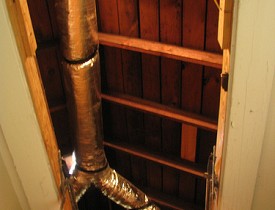High Velocity vs. Low Velocity Air Conditioning Systems
 So you think your air conditioner is pretty cool, right? What if we told you it is a low-velocity system? Suddenly, you might have an inferiority complex about your home’s method of cooling. An alternative is high-velocity systems, which have been around for a while, but are now slowly gaining in popularity.
So you think your air conditioner is pretty cool, right? What if we told you it is a low-velocity system? Suddenly, you might have an inferiority complex about your home’s method of cooling. An alternative is high-velocity systems, which have been around for a while, but are now slowly gaining in popularity.
The major differences between low- and high-velocity air conditioning systems are in the equipment and ductwork. High-velocity systems rely on smaller, more flexible tubing than the standard ductwork for low-velocity systems. They also have an additional air handler that works in conjunction with a standard thermostat and air conditioner or heat pump.
Here's how these differences translate into advantages and disadvantages of high-velocity air conditioning systems.
Advantages of high-velocity systems
• Ease of installation in an older home with no existing central AC system. At just two inches wide, the ducts are much easier to retrofit than the standard eight-inch HVAC ducts. The miniature ducts can run inside walls, below floors and in other tight spaces.
• Suitability for new homes with radiant floor heating. These homes don’t need bulky heating ductwork, so the smaller high-velocity ducts are a good cooling option.
• Efficient cooling. As the name suggests, high-velocity systems typically make a room colder faster, using half the air flow. They also remove up to 30 percent more moisture than standard systems, a particularly strong selling point in hot, humid climates.
• Evener temperatures throughout each room, thanks to the circulation system and high-velocity air.
Disadvantages of high-velocity A/C systems
• Cost. Cost is the main stumbling block for most homeowners. The specialized ductwork for high-velocity systems can be substantially more expensive to buy and install. However, again, retrofitting an older home with these smaller ducts tends to require less additional remodeling work, so they could save money in the long run.
• Noise. The noise level of high-velocity AC systems is also a complaint. When running, some systems sound like wind blowing in the house, although this is not necessarily louder than the mechanical noise of standard AC systems. Specialized sound-deadening equipment available, and many installers promise their systems are nearly silent.
• Comfort. The high-speed air can feel physically uncomfortable.
High-velocity air conditioning systems are a small, but growing segment of the HVAC market. They are ideal for certain situations, but also have drawbacks that should be considered.
Contact a trusted HVAC professional to discuss the right type of air conditioning for your home.
Looking for a Pro? Call us (866) 441-6648

Heating & cooling Average Costs
HVAC Contractors Experiences

The Power Of Multiple HVAC Estimates

Oil Furnace Maintenance Prepares Us For A Cold New England Winter



